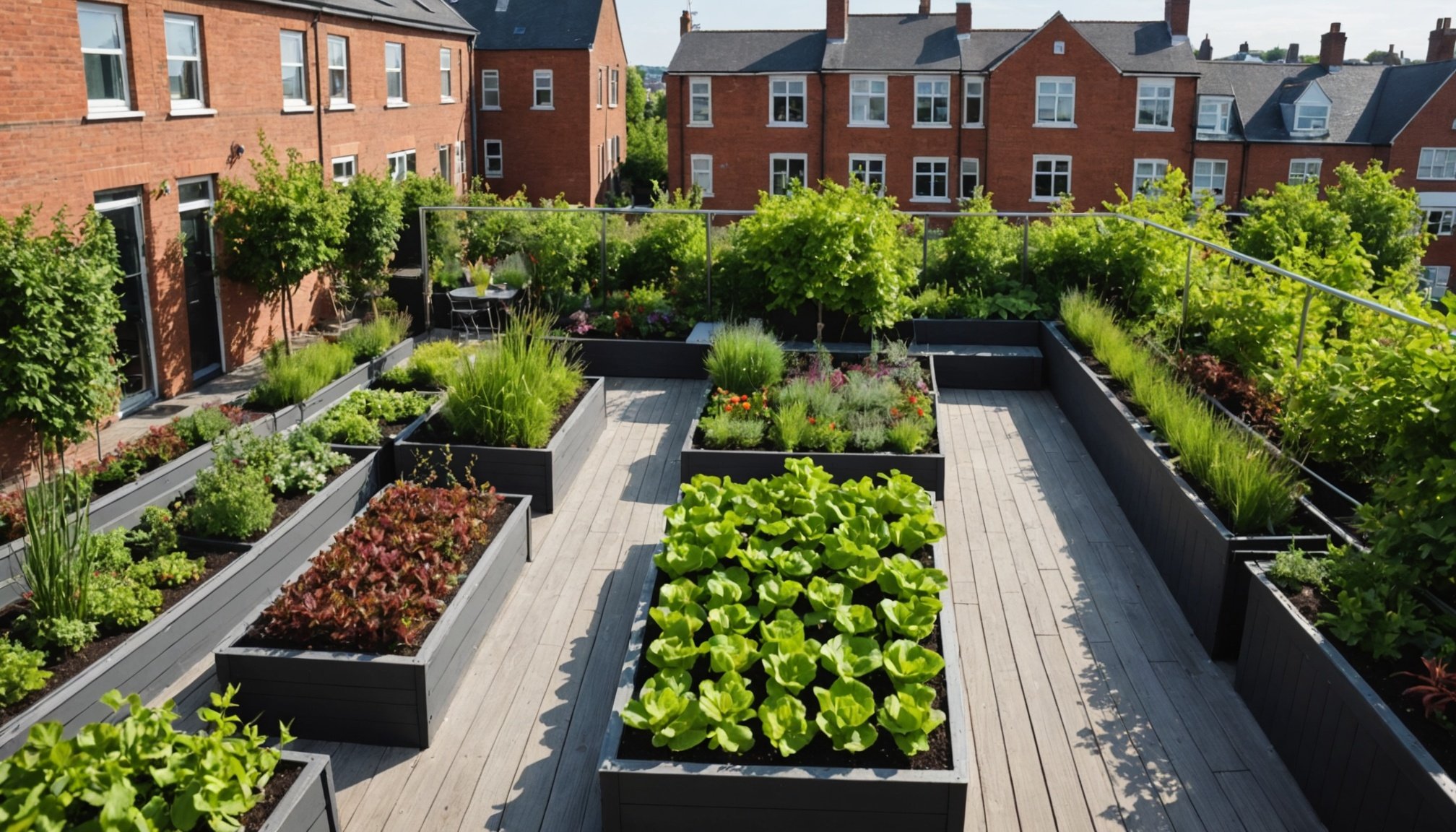Importance of Rooftop Gardens in Urban Living
Rooftop gardens are an increasingly popular solution for promoting urban sustainability. They offer environmental benefits, such as reducing the urban heat island effect through evapotranspiration and shading. This cooling effect can significantly lower building temperatures, decreasing the demand for air conditioning and energy consumption. Moreover, rooftop gardens contribute to improved air quality by absorbing pollutants and releasing oxygen.
In the psychological realm, having access to green spaces within city environments provides substantial mental health benefits. Green spaces are linked to reduced stress levels and can improve overall well-being. These gardens provide a serene escape from the hustle and bustle, acting as a natural retreat that fosters relaxation and mental rejuvenation.
Additional reading : Revitalize your uk home office: clever strategies to reduce eye strain and boost natural light
Rooftop gardens also increase biodiversity in urban areas by providing habitats for various species. This can promote ecosystem balance, drawing in pollinators like bees and butterflies. These vital creatures are essential for maintaining diverse and healthy urban ecosystems. The integration of diverse plant species can create a harmonious environment that supports a variety of life forms within cities.
By addressing these benefits, rooftop gardens stand out as a critical component of modern green living initiatives, offering both environmental and psychological advantages.
Have you seen this : Ultimate guide to maintaining your uk home”s chimney for peak performance
Key Considerations for Designing a Rooftop Garden
Designing a rooftop garden requires thoughtful planning to ensure both safety and functionality. Understanding the structural integrity and weight limits is crucial. Not all rooftops can bear the additional load of soil, water, and plant life. Consulting with a structural engineer can prevent potential hazards, ensuring your garden stays safely rooted.
Maximizing sunlight exposure while providing wind protection is another key element in rooftop garden design. Given urban settings, buildings might cast unpredictable shadows, necessitating strategic plant placement. Wind, particularly at higher altitudes, can be intense, so incorporating elements like screens or other barriers can shield delicate plants while ensuring they receive ample light.
Creating functional spaces enhances the usability of the garden. Thoughtful layout choices involve defining areas for seating, planting, and pathways. This not only makes the garden more accessible but also more inviting, encouraging regular use. Seating areas should be positioned to maximize views and sunlight while maintaining proximity to greenery.
In conclusion, focusing on these considerations can transform a bare rooftop into a thriving, usable green space. Balancing structural awareness, environmental factors, and layout design ensures your urban garden is both beautiful and sustainable.
Suitable Plants for UK Rooftop Gardens
Choosing the best plants for rooftop gardens in the UK involves considering climate resilience and low maintenance needs. Hardy native plants are ideal for these environments, as they adapt well to local weather and require minimal care. Species like sedums and grasses naturally thrive in exposed settings, making them excellent choices.
Native Plants
Native plant options include bee-friendly flora like wild thyme and violets, promoting urban biodiversity. These not only enhance ecological balance but also add natural beauty to the garden. Selecting native species ensures compatibility with local pollinators, creating harmonious urban ecosystems.
Edible Plants
Edibles, such as herbs and vegetables, serve dual purposes—providing fresh produce and enriching urban aesthetics. Mint, thyme, and chives grow well in containers, offering both culinary and aromatic benefits. Edibles emphasize the advantages of urban planting choices by supporting local food production.
Ornamental Plants
For ornamental plants, consider drought-tolerant varieties that maintain lush appearances despite limited water access. Lavender and ornamental grasses bring colour and texture, elevating visual appeal without excessive upkeep. These plants combine aesthetics with practicality, contributing to vibrant and welcoming rooftop gardens.
By choosing suitable plants, UK rooftop gardens can achieve ecological balance and visual charm.
Soil and Drainage Systems for Rooftop Gardens
Ensuring proper soil for rooftop gardens is essential for promoting plant health and structural safety. Using a lightweight, high-quality soil mix can mitigate the risk of overloading the rooftop while providing adequate nutrients. This soil should be well-aerated, maintaining moisture without becoming dense or waterlogged.
An effective drainage system is equally vital in preventing water accumulation that could lead to root rot or structural damage. Implementing layers of drainage material, such as gravel or expanded clay, beneath the soil helps to create efficient water pathways. This not only avoids waterlogging but also promotes healthy root development.
For optimal growth, incorporating planters and raised beds serves as a practical solution, especially on rooftops with variable weight-bearing capacities. Planters allow for controlled soil use, while raised beds provide additional depth, supporting a wider range of plants. These structures can be easily adjusted or relocated, making them advantageous for urban gardening.
Focusing on these critical components, from soil selection to drainage solutions, supports the sustainability and success of a rooftop garden. By tailoring soil and drainage to your specific environment, you ensure your urban green space remains thriving, vibrant, and structurally sound.
Sustainable Gardening Techniques
Incorporating sustainable gardening practices into a rooftop garden can enhance its eco-friendly profile while maintaining its functionality. Water conservation is a cornerstone of sustainable gardening, achieved through techniques such as drip irrigation and rainwater collection systems. These methods ensure efficient water use, reducing waste and supporting plant health even in dry spells.
Opting for organic pest control methods also supports environmentally conscious gardening. Encouraging natural predators like ladybirds and using organic sprays can effectively manage pest populations while preserving beneficial insects. Regular monitoring and manual removal of pests can further reduce the need for chemical interventions, aligning with eco-friendly gardening principles.
Utilising recycled materials in garden structures can significantly contribute to rooftop sustainability. Consider repurposing old wood, metal, or plastic to create planters, raised beds, and garden furniture. This not only reduces waste but also adds a unique aesthetic to your garden, promoting the creative use of resources.
By focusing on these sustainable techniques, a rooftop garden can become a beacon of urban sustainability, demonstrating the practical and environmental benefits of eco-friendly gardening. These practices support a thriving garden ecosystem while highlighting the importance of resource conservation in urban settings.
Maintenance and Care for Your Rooftop Garden
Proper maintenance is essential to keep a rooftop garden thriving in an urban environment. Establishing a regular watering and feeding schedule is crucial. The elevated position can lead to increased exposure to sun and wind, necessitating more frequent watering. Employing efficient irrigation systems, such as drip irrigation, can optimise water use while ensuring consistent moisture levels.
Pruning and seasonal plant care are vital for promoting healthy growth and preventing overcrowding. Regularly trimming plants encourages bushier growth and allows sunlight to reach lower foliage. Additionally, recognising seasonal changes and adjusting care routines ensure plants are prepared for varying weather conditions, enhancing their resilience against harsh climates.
Managing pests and diseases naturally protects both plant health and the environment. Encouraging beneficial insects and employing organic solutions can effectively control pest populations without resorting to chemical treatments. Consistent monitoring and early intervention are key to preventing infestations, allowing the garden’s ecosystem to thrive harmoniously.
Implementing these plant care tips not only supports the longevity and vitality of a rooftop garden but also contributes to the broader goals of urban gardening upkeep, fostering a beautiful and productive green space. By understanding the unique demands of rooftop environments, gardeners can ensure lasting success.
Potential Benefits of Rooftop Gardens
Exploring the benefits of urban gardens, one cannot overlook their significant contributions to local food sources. By cultivating fruits, herbs, and vegetables, rooftop gardens transform otherwise unused spaces into productive urban farms. Only a small plot can yield a surprising bounty, promoting self-sufficiency and reducing reliance on imported produce.
Another major advantage is the enhancement of mental health and green spaces. These gardens provide residents with accessible natural areas, crucial for stress relief and psychological well-being. Studies emphasize the positive impact of greenery on mood and cognitive function, making rooftop gardens essential urban sanctuaries.
Community engagement arises from shared urban gardening activities. These spaces offer residents opportunities to bond over communal projects, fostering cooperation and social cohesion. Such community gardens also create educational platforms, teaching participants about sustainability, botany, and environmental responsibility.
Furthermore, rooftop gardens enhance property value and aesthetic appeal. The integration of lush greenery can differentiate properties, making them more attractive to buyers or tenants. These gardens not only deliver aesthetic charm but also reflect a commitment to sustainability, increasing the desirability of urban residences. Thus, rooftop gardens encompass multifaceted advantages, from ecological impact to community building and personal enrichment.











